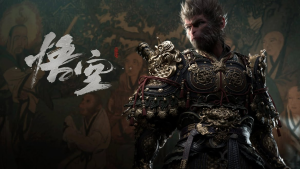Producer of Black Myth: Wukong- Cultural Export is Not Our Goal

Xinhua News: “Black Myth: Wukong” draws on traditional Chinese mythology. Why did you choose the theme of Journey to the West?
Feng: When we chose the Journey to the West theme, we weren’t considering its popularity or whether it was outdated. Instead, we asked ourselves if we felt excited about the theme. We believed that Chinese mythology or these Eastern, yet magical elements still had more potential. The stories we had encountered from Western mythology made me wonder how I could make Chinese mythology equally captivating. For example, if we think about The Lord of the Rings, it also involves a group of individuals embarking on a challenging quest, much like the Journey to the West story in structure. Although their narrative styles differ and their world-building settings vary, the core essence isn’t drastically different. The disparities between Wu Cheng’en (the author of Journey to the West) and Shakespeare aren’t that significant.
Xinhua News: What was your approach?
Feng: Let me summarize. In my childhood, I watched the television series Journey to the West produced in 1986, followed by animated series and various adaptations. Initially, our joy stemmed from sensory stimulation. We found Sun Wukong brave and handsome, engaging in battles with various Yao guai (monsters), which was our initial understanding of the charm of Sun Wukong and the Journey to the West story. Later on, we shifted our focus not only to Sun Wukong but also to his adversaries. Could we also portray his enemies well? When these enemies are complex and perhaps have a kind side or hidden traits unknown to the public, or when they possess a personality charm that directly fights against Sun Wukong, it allows for a deeper portrayal of Sun Wukong. The classics don’t constrain us; they form the foundation, and we express them in a more modern language and way.
Xinhua News: You mentioned that the initiation of the “Black Myth: Wukong” project was at a relatively suitable time and a cautious decision. How do you define it as the right time?
Feng: Eight years ago, we firmly believed that China’s single-player market not only existed but would be substantial. Look at other entertainment markets, such as movies; in recent years, a quick glance at the data reveals a subtle shift in the top 10 box office movies. We see well-made Chinese films rapidly climbing this list.
In 2016, we observed the US single-player market at around $10 billion, Japan over $5 billion, Europe (which we didn’t precisely calculate at the time), and China at less than $1 billion. We decisively stated that within 10 to 15 years, we believed China’s single-player market would reach or even surpass Japan’s scale.
Xinhua News: In 2020, you released the first gameplay trailer that garnered significant attention and praise. What factors led to such a high level of interest and positive feedback?
Feng: First of all, we can categorize this matter by saying it was purely a lucky accident, not something we intended to achieve because it was impossible. At that time, our real challenge was actually finding people because we were trying to do something quite difficult. So, at that time, we thought of making a recruitment video to promote the project and perhaps increase its visibility. Initially, we internally thought that having 500,000 views on the video would be great, but it ended up exceeding our expectations by 100 times.
 The first gameplay trailer of Black Myth: Wukong gained about 58 million views in China
The first gameplay trailer of Black Myth: Wukong gained about 58 million views in China
Our initial reaction was that this success might not necessarily be due to our exceptional work. We often joked internally that while it might be a 90 out of 100 product internationally, domestically, it might just be a 75, merely because we carried the genuine love people have for our nation and culture. With the evolution of the software industry, commercial engines have emerged with a plethora of mature solutions. At this point, all you need to do is showcase its performance as you desire; this is a technological dividend. So, in reality, we were just fortunate enough to live up to everyone’s expectations at the right time.
Xinhua News: This game carries many labels, such as Chinese style, cultural export, and so on, and it has garnered significant attention overseas. My question is, are these elements of traditional Chinese culture being exported means or ends?
Feng: Firstly, we acknowledge the fact that we are indeed a Chinese team creating content based on Chinese themes and it has some influence overseas. Whether it’s an end or a means, I don’t think we should see it as an end goal. However, when defining this, we need to be more practical. You need to set these aside and think first, can you achieve the same standards without these labels? I believe good cultural or content products should first naturally resonate with local cultural groups similar to the creators. If the quality is high enough and it endures for a sufficient period, it will naturally radiate to the overseas market we are talking about. Its Chinese-style label won’t grant you immunity privileges, or allow you to compromise on quality. In fact, there should be an even greater sense of responsibility; you should tread carefully, possibly exert more effort, and think about how to integrate it with the best qualities of products in the world.
 Chinese ancient temples are scaned and displayed in-game
Chinese ancient temples are scaned and displayed in-game
Xinhua News: With so many Chinese elements in the game, will overseas players be able to understand and appreciate them while playing?
Feng: I believe this can be seen from two perspectives. There is certainly novelty, as such themes are rarely explored through games. However, beyond the sensory stimulation, there are thresholds to overcome. For example, the roles in our culture or Chinese mythology, like the Tudigong, have subtle connotations. Is he the lord of the land? Is he the local official? He might be a unique Chinese mythical being but cannot control the Yao guai. He understands the local customs and nuances. When it comes to defining a character like him, I found this translation to be particularly challenging. At times like this, we would pause and consider if we could use readily understandable concepts from overseas. Eventually, we came up with a word, ‘keeper.’ This word might have a subtle implication, representing that he is aware of the situation here and maintains the relationships here. For instance, in Chinese culture, character levels might be termed as “Daoxing” or “Lingyun,” unique to Chinese culture. For example, instead of translating “Wukong” into another language, we simply kept it as is because it sounds pleasant and clear. When Wukong fights Yao guai with his weapon, the RuyiJingu bang is what he uses. Of course, we can describe it as a long wooden staff, a golden-plated rod but we still decided to call it “Jingu bang”. In the end, the translation turns out Wu Kong takes Jingu bang to hit Yao Guai.
 Keeper
Keeper
Xinhua News: From an outsider’s perspective, it’s intriguing why, despite having so many rich themes, the first AAA game is only emerging now. What are your insights on this?
Feng: Firstly, the technological barriers are high. Perhaps a decade ago, creating a game like this might have required twice the resources. Furthermore, the evolution of the market dynamics due to development changes. Before the internet, foreign markets might have already seen a plethora of standalone games, forming established consumer habits. The late 1990s and early 2000s witnessed the internet revolution and the rise of online gaming, propelling China from the era of standalone games to a stage where everyone could experience online gaming on PCs. This rapid transformation, within two decades, from a non-existent market to the world’s largest, is an achievement but its cost is usually overlooked. It’s not that by creating a game, we can bridge the gap between China in single-player games and foreign companies. But the goal of your entire career should be to catch up with them, even to stand shoulder-to-shoulder with them. It’s impossible to say that we are more mature than well-established gaming companies, but we must have the ambition to create world-class games.
Xinhua News: Would you consider yourself more of an idealist or a pragmatist?
Feng: Many might perceive us as a team driven by passion and idealism, willing to disregard everything for our cause, and I appreciate that perception. However, for sustainability, one must consider the practicality daily. I believe these two aspects can be combined – aspiring to be a pragmatic idealist. As the saying goes, what truly pains you is not the distant mountains but the sand in your shoes. The sand is endless, but to reach that mountain, you must endure this process. Recognizing this challenge is essential; isn’t that what makes it great? Embarking on the journey is more important than reaching Ling shan (the destination).
https://h.xinhuaxmt.com/vh512/share/12150566?d=134d9b3




